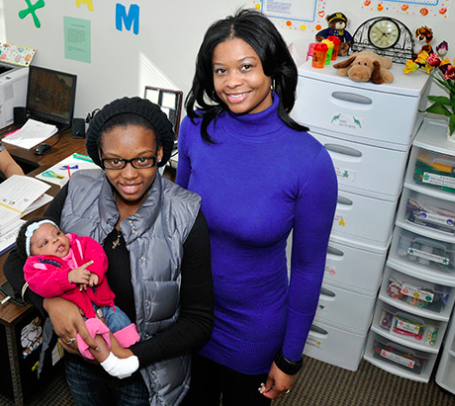How mentoring can empower legally blind college students to apply for jobs
 O’Mally, J., & Antonelli, K. (2016). The effect of career mentoring on employment outcomes for college students who are legally blind. Journal of Visual Impairment & Blindness, 110(5), 295-307. https://doi.org/10.1177/0145482X1611000502
O’Mally, J., & Antonelli, K. (2016). The effect of career mentoring on employment outcomes for college students who are legally blind. Journal of Visual Impairment & Blindness, 110(5), 295-307. https://doi.org/10.1177/0145482X1611000502
Summarized by Karina DeAndrade
Notes of Interest: The purpose of this longitudinal study was to evaluate if having a mentor would increase determination and confidence in legally blind college students when seeking out and applying for jobs. Data were collected from 77 participants between the ages of 20 and 35. Findings suggest that having a mentor to help guide college students who are legally blind helped build courage and confidence when applying to jobs. Findings also suggest that legally blind college students could use more support on their graduation track and knowing when they will graduate.
Introduction (Reprinted from the Abstract)
College graduates with visual impairments (that is, those who are blind or have low vision) often face challenges in securing competitive employment after graduation. Working with a mentor who is also visually impaired, and working in the same field, can provide important benefits to overcome these barriers. A nationwide longitudinal study, involving random assignment to an intervention group working with a mentor or a comparison group given traditional career resources, evaluated changes in job-seeking self-efficacy, assertiveness in job hunting, and career adaptability over the course of one year as legally blind college students prepared to graduate and enter the job market. Employment outcomes, job satisfaction, and evaluation of the mentoring program were also measured.
Those working with mentors demonstrated increased job-seeking self-efficacy, career adaptability, and significant gains in assertiveness in job-hunting compared to those receiving only traditional job-search resources. Although no significant differences were found between groups for employment rate or job satisfaction, participants reported high satisfaction with the program. Working with a mentor demonstrated positive trends for self-efficacy, career adaptability, and significant increases in job-hunting assertiveness among visually impaired college students with legal blindness. Participants were highly committed and found the program beneficial. Small sample size may have limited the ability to detect significant differences in employment outcomes.
Implications (Reprinted from the Discussion)
We predicted that participating in a career mentoring relationship would significantly improve employment outcomes for legally blind college students, compared to those using traditional career preparation resources. Students working with mentors were significantly more assertive in job hunting and showed trends in improvement for job-seeking self-efficacy and career adaptability. Despite these positive trends, however, the mentoring relationship did not have a significant influence on employment rates and job satisfaction.
Based on our recruitment experiences, we found that professionals and students in the visually impaired community are highly interested in mentoring. The number of participants in this study underestimates the number of those interested, given the narrow eligibility criteria. Mentors across the United States were eager to volunteer their time, and many college students expressed a desire to work with a mentor but were excluded from participating due to age or late graduation dates. The retention rate for this project was impressively high for a longitudinal study, indicating that students and mentors were invested. In addition, participants evaluated the project as being beneficial, and most planned to stay in contact with each other after the study.
Delayed graduation, an unanticipated issue that arose in this study, raises an important concern. Several students in this study lacked the ability to accurately predict when they would graduate. This problem is worth noting because students need to be prepared to provide potential employers with an accurate expected graduation date. Students with visual impairments may need more assistance formulating realistic degree plans.
To access this article, click here.










